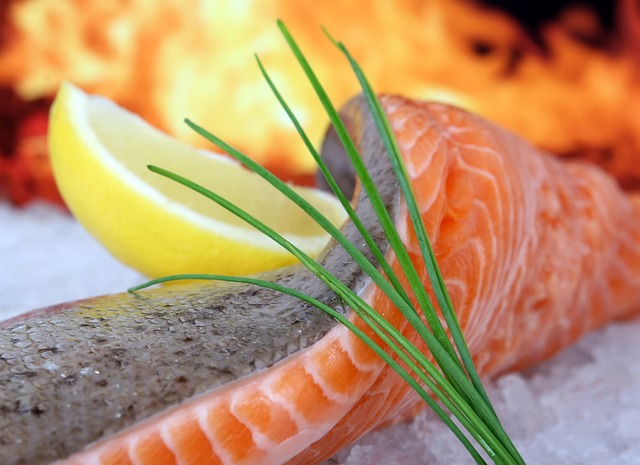Pescatarian Diet
The word pescatarian originates from the Italian term pesce, which signifies multiple fish.
According to Cara Harbstreet, a registered dietitian based in Kansas City and author of The Pescatarian Cookbook: The Essential Kitchen Companion, a pescatarian diet emphasizes fish and seafood as the main source of protein. Those who adhere to this diet may also opt to consume eggs and dairy products in their meals and snacks.
The term “pesco-vegetarian” is commonly used in scientific literature to describe this diet, which falls under the umbrella of vegetarianism. Essentially, a pescatarian is a person who follows a vegetarian diet but includes fish and other types of seafood in their meals.
It’s a largely plant-based diet of whole grains, nuts, legumes, produce and healthy fats, with seafood playing a key role as a main protein source. Many pescatarians also eat dairy and eggs.
Certainly, similar to the broad range in vegetarian diets, pescatarian diets can also differ greatly. It is feasible to maintain a diet free from meat that includes excessive amounts of refined carbohydrates, unhealthy snacks, and fish-based processed food, rather than a more wholesome diet emphasizing whole foods.
A pescatarian is an individual who primarily adheres to a vegetarian diet with the inclusion of fish and seafood in their meals.
Harbstreet explains that pescatarians usually include at least two seafood meals in their weekly diet, but it is not solely based on fish. The rest of their meals and snacks consist of plant-based foods and follow a Mediterranean-style eating pattern.
Why You May Consider Becoming a Pescatarian
Most people consider a pescatarian diet because of its health benefits, says
Nicole Hallissey, RDN,
a registered dietitian-nutritionist in New York City and the author of
The Truly Healthy Pescatarian Cookbook: 75 Fresh & Delicious Recipes to Maintain a Healthy Weight.
Some individuals may choose to follow a pescatarian eating plan due to their ethical beliefs and a wish to abstain from consuming meat other than fish, like cows or chickens.
According to a study, women who followed a pescatarian diet gained 2.5 pounds (1.1 kg) less each year compared to women who consumed meat.
Reducing consumption of animal products could benefit individuals regardless of their present eating habits, as evidenced by those who transitioned towards a more plant-based diet experiencing the least amount of weight gain.
A different research found that individuals who follow a pescatarian diet are less susceptible to developing diabetes at a rate of 4.8%, in contrast to omnivores whose risk is 7.6%. Furthermore, a significant study focused on individuals who infrequently ate meat or were pescatarians and discovered that they had a 22% lower risk of suffering from heart disease compared to those who frequently consumed meat.
Environmental Concerns
There is a substantial environmental impact associated with livestock farming. The United Nations indicates that livestock farming is responsible for 15% of all carbon emissions created by humans. In comparison, the production of seafood and fish has a lower carbon footprint than any form of animal meat or dairy.
According to a study in 2014, individuals consuming fish-based diets produce 46% fewer greenhouse gas emissions in comparison to those who consume at least one serving of meat daily.
Ethical Reasons
Opting for a vegetarian diet may be heavily influenced by ethical considerations. The same can hold true for pescatarians as well. Various ethical grounds can explain why individuals refrain from consuming meat, which include:
- Opposing slaughter: They don’t want to kill animals for food.
- Inhumane factory practices: They refuse to support factory farms that raise livestock in inhumane conditions.
- Poor labor conditions: They refuse to support factory farms that have poor conditions for their workers.
- Humanitarian reasons: They consider producing grain for animal feed an unjust use of land and resources when there’s so much hunger in the world.
By excluding terrestrial animals from your food choices, you can tackle some ethical issues. Nonetheless, ethical problems may also arise from aquaculture and excessive fishing. Thus, the Seafood Watch initiative by Monterey Bay Aquarium is a valuable tool to locate fish that are either sustainably caught or farmed.
People opt for a pescatarian diet for various reasons, such as health concerns, ethical considerations, and environmental issues.
Foods to Eat and Avoid on a Pescatarian Diet
According to Harbstreet, the pescatarian diet isn’t inflexible but permits flexibility. Despite usually avoiding meat, pescatarians may consume a chicken breast, for example, during a communal meal. Nevertheless, the ensuing list of foods outlines common choices for those following this diet.
What to Eat
- Fish
- Shellfish
- Eggs (optional)
- Yogurt (optional)
- Cheese (optional)
- Milk (optional)
- Beans and legumes
- Tofu
- Vegetables
- Fruit
- Nuts and seeds
- Whole grains (whole-grain pasta, bread, and brown rice count)
What to Avoid
- Poultry
- Beef
- Lamb
- Pork
- Deli meat
- Bacon
Are Some Fish Better Than Others in a Pescatarian Diet
Fattier fish are “oilier” fish, and they tend to have a more fish-forward taste. White fish like
tilapia
and cod are far milder in taste, but also contain fewer omega-3s. Shrimp and scallops also tend to have an easy-to-like flavor, she says.
Whenever possible, it’s crucial to opt for fish that has been sourced sustainably. To aid in this, Hallissey suggests referring to the Monterey Bay Aquarium Seafood Watch, a resource that provides location-specific buying guides that can be easily printed or downloaded. For those interested in purchasing canned fish, the Wild Planet line is an excellent choice as it sources its products sustainably and offers a variety of options such as salmon, sardines, tuna, mackerel, and others.
Health Benefits of a Pescatarian Diet
risk of heart disease, stroke, sudden cardiac death, and congestiveheart failure.
Additionally, according to a distinct extensive study, individuals who consumed the highest amount of fish had a reduced probability of mortality from any cause by 9% and 8% for men and women, respectively, compared to those who consumed the least amount. The scholars suggest that the life-extending advantages are likely attributed to the anti-inflammatory omega-3s.
Because this is also a plant-based diet, you’ll reap all the advantages of eating ample vegetables, fruits, legumes and beans, and nuts and seeds of all kinds. Plant-based diets have been shown to improve weight, metabolism, the
gut microbiome, and inflammation across groups of people, including those who are healthy, have type two diabetes, or have obesity, according to a research review.
Getting omega-3 fatty acids is most effectively achieved by consuming fish.
Alpha-linolenic acid (ALA), a variety of omega-3 fatty acid, exists in specific plant-based foods like flaxseeds and walnuts. Nevertheless, the human body doesn’t efficiently transform this type of ALA into eicosapentaenoic acid (EPA) and docosahexaenoic acid (DHA).
In addition to benefiting the heart, DHA and EPA also have health advantages for enhancing mood and brain function. EPA and DHA can be found in oily fish such as sardines and salmon.
Boost Your Protein Intake
To stay healthy, humans require only 0.8 grams of protein per 2.2 pounds (1 kg) of body weight daily, which amounts to approximately 54 grams for someone weighing 150 pounds (68 kg). Nevertheless, numerous individuals choose to consume greater quantities of protein.
Getting sufficient protein solely from plant sources can be challenging, particularly if you want to limit your carb or fat intake. Seafood and fish provide a fantastic source of low-fat protein.
Seafood Is Packed With Other Nutrients
Seafood contains numerous nutrients in addition to omega-3s and protein. Oysters, for example, are a great source of vitamin B12, zinc, and selenium, with a single oyster supplying 133% of the recommended daily intake of vitamin B12 and 55% of the recommended daily intake of zinc and selenium.
Additionally, mussels contain significant amounts of selenium, vitamin B12, B vitamins, and manganese. On the other hand, white fishes like flounder and cod do not provide high levels of omega-3 fats, however, they are a good source of low-fat protein.
Taking cod as an instance, a mere 3 ounces of it supply 19 grams of protein and less than 1 gram of fat while serving as a notable source of selenium and a decent source of phosphorus, niacin, and vitamins B6 and B12.
You’ll Have Extra Options
Following a vegetarian diet can pose certain restrictions, particularly when it comes to dining out. It is common to find unwholesome vegetarian alternatives such as cheesy pasta on most menus. Opting for a pescatarian diet could be beneficial if you prioritize health in your food choices, as it allows for a wider range of options.
Fish, primarily if prepared by baking, grilling or sautéing, is a beneficial option compared to deep-frying. Incorporating seafood into a vegetarian meal plan presents a wider range of choices and is a suitable approach for obtaining protein, omega-3 fatty acids and other essential nutrients.
There are not many health drawbacks of this diet. That said, some people may be more vulnerable to high intakes of fish. Fish, especially larger species, can contain
mercury
and other toxins.
Tilefish, swordfish, shark, and king mackerel are advised by the US Food and Drug Administration (FDA) to be avoided by women of childbearing age, especially those who are pregnant or nursing, as well as young children.
To stay safe, it is advised that these populations restrict their consumption of albacore and yellowfin tuna to one serving that is no larger than the size of a palm every week. It is acceptable for them to eat 2-3 servings of light tuna per week as it contains less mercury.
Due to its mostly vegetarian nature, this diet is susceptible to similar pitfalls commonly associated with vegetarian diets. For example, one may easily consume an excess of carbohydrates, particularly if relying heavily on processed grains.
A pescatarian diet may have certain disadvantages, such as the tendency to consume excessive carbohydrates and the presence of high levels of mercury in certain fish.
Pescatarian Diet for Weight Loss
Following a pescatarian diet may aid in weight reduction. This specific diet is classified as a type of plant-based diet that usually excludes animal items, except for eggs and fish if desired.
Melissa Mitri, RD and owner of Melissa Mitri Nutrition in Connecticut, warns that the opposite can occur. Those who adhere to a plant-based diet may unintentionally consume excessive refined carbs that lead to weight gain, earning them the nickname “carb-eterian.” Thus, following a pescatarian diet correctly can boost the probability of successful weight loss.
Generally speaking, opting for a diet that mainly consists of plant-based foods and incorporating seafood is a beneficial decision for one’s health.



